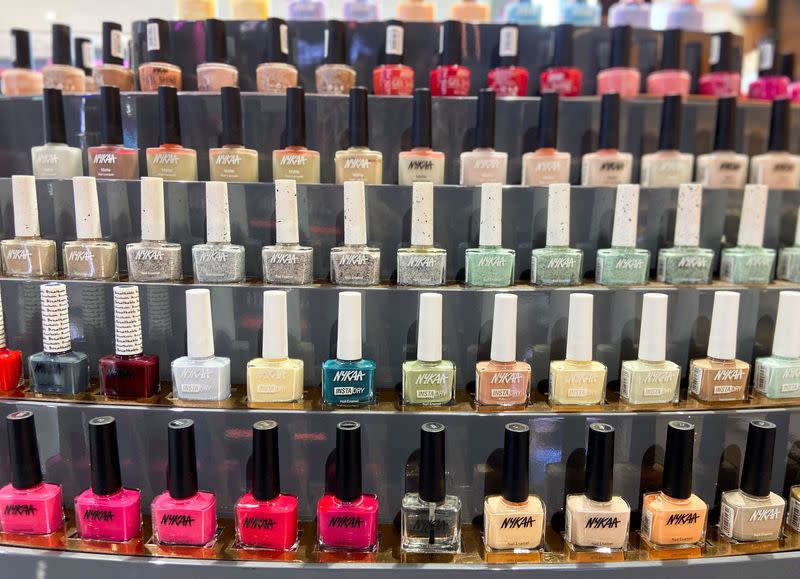India's February retail inflation rises faster than expected

(Reuters) - India's annual retail inflation in February rose at a faster-than-expected pace due to higher food prices, government data showed on Tuesday.
Annual retail inflation eased slightly to 5.09% in February from 5.10% in January, but was higher than 5.02% forecast by a Reuters poll of 42 economists.
Food inflation, which accounts for nearly half of the overall consumer price basket, rose 8.66% in February, compared with a 8.30% rise in January.
COMMENTARY:
ADITI NAYAR, CHIEF ECONOMIST, ICRA, GURUGRAM
"Unless growth posits a negative surprise in the intervening months, we now see a dimmer possibility of the stance being changed in the June or August 2024 (RBI's) Monetary Policy Committee reviews."
YUVIKA SINGHAL, ECONOMIST, QUANTECO RESEARCH, NEW DELHI
"For FY24, CPI remains on track to average at 5.4%. The anticipated normalisation of global El Nino conditions augurs well for 2024 Southwest monsoon and further abatement of food price pressures.
Having said so, we maintain a close watch on spillovers from climate risks as well as escalation in merchandise trade costs post diversion of trade away from Red Sea region across the Cape of Good Hope."
MADAN SABNAVIS, CHIEF ECONOMIST, BANK OF BARODA, MUMBAI
"Rural inflation is higher at 5.3% and urban at 4.8%. This is mainly due to the higher weight of food products in the index.
Across states, 12 of the 22 tracked witnessed inflation of above 5.1%. Odisha had the highest while Delhi had the lowest at 7.6% and 5.3%, respectively.
Overall, both (CPI inflation for February and IIP production for January) the indicators are quite positive and show the economy is on track."
DEVENDRA KUMAR PANT, CHIEF ECONOMIST, INDIA RATINGS AND RESEARCH, GURUGRAM
"Weak core inflation at a time of strong growth is a conundrum, the only reason could be the weak input price growth. Expect a status quo on policy rates in near term."
SUJAN HAJRA, CHIEF ECONOMIST AND EXECUTIVE DIRECTOR, ANAND RATHI SHARES AND STOCK BROKERS, MUMBAI
"The persistence of low core inflation would prompt the RBI to keep its monetary policy unchanged, even though retail inflation exceeds the central bank's target rate and GDP growth has surpassed expectations.
Despite anticipated rate cuts by major central banks in advanced economies by mid-year, the RBI is expected to maintain its current policy stance in the near term.
The stability of India's macroeconomic environment continues to support orderly developments in its financial markets.
RADHIKA RAO, SENIOR ECONOMIST, DBS BANK, SINGAPORE
"Overall, recent inflation prints, though above the target, are stable, with March tracking a shade below 5%, suggesting the quarter's average will not be far from the central bank's projection. With food inflation still a pocket of concern, the central bank is likely to extend its cautious stance on the rates front."
UPASNA BHARDWAJ, CHIEF ECONOMIST, KOTAK MAHINDRA BANK, MUMBAI
"RBI will remain cautious on volatile food inflation trajectory and hence prefer to remain in pause mode on rates till August policy. However, with RBI already having continuously fine-tuning liquidity and easing overnight rates closer to repo rate, we see room for a shift in stance in the June policy."
GARIMA KAPOOR, ECONOMIST, INSTITUTIONAL EQUITIES, ELARA CAPITAL, MUMBAI
"The CPI came in broadly in line with expectations, with core inflation falling to an all-time low adding to comfort.
Continued weakness in commodity prices, lagged impact of previous rate hikes and waning pricing power are contributing to subdued core inflation prints.
We expect the (RBI's) Monetary Policy Committee to commence rate cuts by the third quarter, and expect a total of 50 bps (basis points) cut this fiscal year.
THAMASHI DE SILVA, ASSISTANT INDIA ECONOMIST, CAPITAL ECONOMICS, LONDON
"Food price inflation edged up last month, which probably offset a drop in energy inflation. Looking ahead, we think that food price inflation will drop back only slowly over the coming months.
That means headline inflation will remain within the RBI's 2%-6% tolerance band but only gradually drop to the central bank's 4% long-term target by the end of the second quarter.
We think the RBI will still take a few more months to pivot towards policy loosening. We expect the central bank to start cutting rates in the third quarter."
SUVODEEP RAKSHIT, SENIOR ECONOMIST, KOTAK INSTITUTIONAL EQUITIES, MUMBAI
"February CPI inflation print does not add to any further worries. We expect the inflation trajectory to remain around 4.5%-5% in FY2025, with a sharp base effect led dip to around 3% in the second quarter."
(Reporting by Anisha Ajith, Hritam Mukherjee, Ira Dugal, Yagnoseni Das, Ashish Chandra, Dhanya Skariachan, Nishit Navin, Rama Venkat and Kashish Tandon; Editing by Sonia Cheema)


